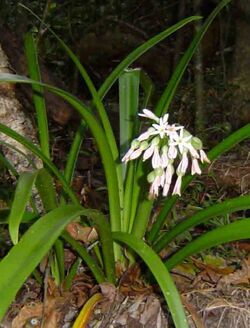Biology:Cliviinae
| Cliviinae | |
|---|---|
| File:Clivia Nobilis.TIF | |
| Clivia nobilis | |
| Scientific classification | |
| Kingdom: | Plantae |
| Clade: | Tracheophytes |
| Clade: | Angiosperms |
| Clade: | Monocots |
| Order: | Asparagales |
| Family: | Amaryllidaceae |
| Subfamily: | Amaryllidoideae |
| Tribe: | Haemantheae |
| Subtribe: | Cliviinae D. & U. M.-D.[1] |
| Type genus | |
| Clivia Lindl.
| |
| Genera | |
| Synonyms | |
|
Clivieae Traub | |
Cliviinae is a small subtribe of Haemantheae, and therefore within the African clades of Amaryllidoideae. It consists of two genera, Clivia, and Cryptostephanus.
Description
Bulbless rhizomatous perennial plants. Clivia has showy orange or yellow flowers, while Cryptostephanus has smaller flowers with a paraperigone that had them erroneously classified with Narcissus in the past. it is also the only Haemantheae genus with a phytomelanous seed testa.[1]
Taxonomy
For the early taxonomic history of these two genera, see Meerow and Clayton (2004).[1] (Traub described this grouping as tribe Clivieae in his 1963 monograph on the Amaryllidaceae, based on the type genus Clivia. .[2] Subsequently, the Müller-Doblies' reduced it to a subtribe and placed it within the Haemantheae.[3] Later molecular phylogenetic research has confirmed this placement, with Cliviinae being one of three subtribes of Haemantheae.[1]
Phylogeny
The Cliviinae are placed within the Haemantheae as follows:
| Tribe Haemantheae |
| ||||||||||||
Subdivision
- Clivia (5 species)
- Cryptostephanus (2 species)
Distribution and habitat
Clivia is found in summer rainfall regions, as herbaceous understory plants of coastal and Afro-montane forest, while Cryptostephanus are plants of savanna or forest habitats.[1]
Ecology
Butterfly and sunbird pollination.[1]
References
Bibliography
- Meerow, Alan W.; Snijman, Deirdre A. (2006). "The never-ending story: multigene approaches to the phylogeny of Amaryllidaceae". Aliso 22: 355–366. doi:10.5642/aliso.20062201.29. http://naldc-legacy.nal.usda.gov/naldc/download.xhtml?id=2425&content=PDF. Retrieved 25 January 2015.
- Vigneron, Pascal. "Amaryllidaceae" (in French). http://www.amaryllidaceae.org//index.htm.
- "Amaryllidaceae: A taxonomic tool for the Amaryllidaceae of the world". eMonocot. http://amaryllidaceae.e-monocot.org/.
- Traub, H.P. (1963). Genera of the Amaryllidaceae. Genera of organisms. La Jolla, California: American Plant Life Society. http://babel.hathitrust.org/cgi/pt?id=mdp.39015006929270;view=1up;seq=3.
- Müller-Doblies, U.; Müller-Doblies, D. (1996). "Tribes and subtribes and some species combinations in Amaryllidaceae J St Hil R Dahlgren & al. 1985". Feddes Repertorium 107 (5–6): S.c.1–S.c.9.
- Spies, P.; Grobler, J.P.; Spies, J.J. (2011). "A review of phylogenetic relationships in the genus Clivia". Philos. Trans. Genet. 1: 168–207. https://www.researchgate.net/publication/256716776.
- Conrad, Ferozah (February 2008) (PhD Thesis). Molecular Systematics, Biogeography and Dating of the tribe Haemantheae (Amaryllidaceae) and the Phylogeography of Clivia. Department of Botany, University of Cape Town. http://open.uct.ac.za/bitstream/handle/11427/6243/thesis_sci_2008_conrad_f.pdf?sequence=1.
- Spies, Paula (December 2013) (PhD Thesis). A comparison of the efficiency of DNA barcoding regions in a small and a large genus. Department of Genetics, University of the Free State. http://scholar.ufs.ac.za:8080/xmlui/bitstream/handle/11660/1906/SpiesP-1.pdf?sequence=1.
External links
Wikidata ☰ Q23012142 entry
 |


